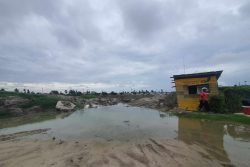It may well be that the atmosphere that obtains at Wakapau in the Pomeroon River has not only ‘preserved’ Aileen Charles, but has also imbued her with an appetite for pursuits which ‘lesser’ women, indeed, lesser persons, would shy away from. At 78, she is a farmer though it may come as a surprise that she does not have too many years of farming under her belt.
Her career as a farmer began around three years ago, when she was seventy five. Almost half a century earlier she had become a single parent, a widow and her family’s sole breadwinner after her husband had died. At that juncture, she had been left to raise five children, two girls and three boys, possessed of little in the way of skills with which to join the ranks of the formally employed. Aileen’s endurance, she says was built on seizing opportunities when they came. One opportunity she recalls vividly was having to get into a canoe on Saturdays and traverse the Pomeroon River, selling Tibisiri craft to residents and business houses along the river.
Aileen’s routine was a reflection of how the other half lives, the traversing of the river being the equivalent of the pursuits of travelling salesmen in urban settings. Aileen had been grounded in agriculture. Poverty had driven her parents (as was the case with other parents in her community) to the land. Her family ate what they planted including a range of vegetables. The bitter cassava which they cultivated was used to make cassava bread. Aileen still believes that the decision taken by her mother and stepfather to remove her from school just prior to her sitting the College of Preceptors examination was, essentially, a ‘wrong turn’ in her adolescent life. She is regretful but refuses to dwell on it, half a century on.
Marriage eventually came, to a teacher. He, having been transferred to Bartica, they moved to Bartica where they lived for several years before her husband died. Aileen places considerable importance on the influence of her late husband in the education of her children. Some of them have followed him into the teaching profession. She had been widowed at 29 and left with five children to fend for. To earn a living, she engaged in those pursuits that had been handed down across the generations… handicraft, mostly mats, baskets and other creations fashioned out of Tibisiri. On Saturdays she would simply fill a small paddle boat with products and ply the Pomeroon river… trading.
Her daughter, Jacqueline, being awarded a place to pursue her secondary education at Anna Regina Secondary School presented Jacqueline with a critical challenge. Her daughter, she had decided, would not follow her down the road of a truncated formal education. Every fortnight she travelled to Anna Regina to visit her daughter and to ‘top up’ her finances. A few years later her son, Dion, was also granted a scholarship to attend Secondary School. Nothing pleased Aileen more than the realization that her children were walking a path that she had only dreamt of.
The need to make a committed investment in her children’s secondary education ‘pushed’ the determined mother to work harder. She ‘stepped up’ her work rate, producing increased quantities of handicraft. This meant longer hours with little sleep. Her other three children, while having failed to secure places at secondary school are all literate, numerate and useful citizens. As a businesswoman, Aileen has moved on from a paddle boat to a ‘vessel’ kitted out with a modest 5hp engine. Age has counseled her to ‘manage’ the extent of her physical exertion. Or did it?
Three years ago, she made the decision to step out of the craft business and into farming, embracing the rigorous ‘slash and burn’ method of land-clearing. These days, she cultivates bitter cassava, having secured a market among the villagers who ‘manufacture’ cassava bread. In the beginning, land-clearing, including the felling of trees, cost her $10,000.00. A further $15,000.00 had to be invested in land-clearing, because it takes about three days to burn and clear the land, and still another $20,000.00 for the creation of a mound on which to plant her cassava sticks.
High unemployment means that there was no shortage of labour in the community. Once word had gotten around that Aileen had embarked on a land-clearing exercise, several would-be labourers began to beat a path to Aileen’s door. Farming operations in much of the Pomeroon still cling tenaciously to those tried and tested (even if physically demanding) methods. Cutlasses and hoes are the tried and tested tools of the trade. Flooding, and more recently, Covid-19 had been unkind to farming pursuits in the community. Flooding that has left farms inundated have become commonplace. Some of these are bad enough to result in abandonment of farms that could last for up to a year.
Extended periods of weather that has precluded the cultivation of traditional crops has, Aileen told Stabroek Business, brought about the ‘importation’ into the community of generous quantities of wheaten flour-based bread and rice, commodities that were, previously only a modest part of the diet. Between 2020 and 2021, particularly, the community was compelled to make adjustments to its diet. Aileen recalls that at the height of the Covid-19 pandemic, pensioners were paid a ‘lump sum’ equivalent to six months’ worth of payments. It was, she says, a generous gesture, though pensioners in the community are far from sanguine about having to invest as much as $6,000.00 to travel to Charity to collect their pensions.
At 78, Aileen ought to have long ‘sailed off’ into the sunset of retirement………at least that is what her children think. For her, however, retirement is not ‘on the cards.’ “I love working,” she quips.







